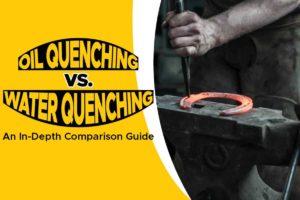
The most common question that people face when quenching is concerned is what type of metal quenching is better. Some prefer to say its oil quenching, while others deny that proclaim and side with water.
Now, if you are confused between oil quenching vs water quenching and wondering which side has the upper hand, then this article is just for you.
This article will break down everything you need to know regarding oil quenching vs. water quenching.
What Is Quenching?
Quenching is a process that is part of the process of hardening materials. The process when a metal or glass material is heated beyond its standard temperature and then put into rapid cooling to instantly cool off the heat is called quenching.
Now the temperature that an object is quenched is above its recrystallization temperature but lower than the melting temperature of that object. Making sure that the temperature is right is a core factor when it comes to quenching.
Usually, we quench metal or glass to increase their hardness and rigidity as an object.
Type Of Quenching
There are four types of quenching process or quenching media, and these are:
- Air: Cooling the heated material with standard room temperature
- Brine: The fasted cooling media in quenching is a mixture of salt and water.
- Oil: A steady and faster option of quenching than air.
- Water: A rapid quenching method, faster than air & oil.
Oil Quenching
Oil quenching is one of the most used quenching processes across the metal quenching industry. It is the ideal process of hardening metal alloys that gives them the hardening and power they need without making them stiff and brittle throughout the process.
The most prominent benefit of going with oil quenching is that it heats up slower than other quenching media and thus cools for a more extended period of time, which helps the heated material have more stability and hardening time.
This also ensures that the quenched material won’t be much brittle and will hold on its own just fine.
As it reduces the chance of quenched metal’s body distortion or cracking, this process is much appreciated than water, air, or brine methods.
Water Quenching
Water quenching is faster than both oil and air cooling, and if you want to go for a fast-paced quenching process, then it is the most optimal way as the brine quenching process has a much harsh reaction while cooling than any other.
The water quenching process is more straightforward than most as you have to put the heated metal into cool water or water at room temperature at the least.
Perhaps the most significant advantage of water quenching is that it is faster than any other quenching process and also least costly and least time costly. In this quenching process, the heated material gets rapidly cooled, and you get an end result very fast.
But with this rapid or instant speed comes a drawback of having stiff, brittle, and easily breakable end products. This can be marked as both a good quality or a bad quality for the quenched material.
It entirely depends on its usage. Most of the time, we don’t harden a metal to have a significant flaw, like insufficient durability and flexibility.
Water quenching is most required for steel quenching as this material is quenched in a unique way than most other materials and metals.
When carboned steels are heated for quenching, they are heated beyond their recrystallizing heat and very close to their melting point, and at this point, without rapid cooling, the steel will melt where water quenching comes in with instant cooling for the steel.
This process needs to be done quite a few times; thus, water quenching is the best viable option unless the brine quenching process is picked, but that is highly unlikely to happen as brine quenching is complicated and requires vast investment.
Oil Quenching Vs. Water Quenching
To get straight to the point, the winner between oil quenching and water quenching depends on your preference. The water quenching process is faster but provides a bit of a brittle end product, where the oil quenching process is a bit slower but provides a much better output in general.
But this doesn’t mean water quenching provides bad end results as some materials can properly be hardened by water quenching only, and oil quenching will cause severe damage to the said material. The same goes for materials that have optimal quenching conditions for oil.
So, if you want faster quenching, then the water quenching process is your winner. Still, if you wish to an overall winner between oil quenching and water quenching, our pick would be Oil quenching for its optimal output in most standard cases regarding quenching.
Frequently Asked Questions
1. Which quenching methods do blacksmiths prefer?
Blacksmiths work with both water quenching and oil quenching methods. But in most cases, they prefer water quenching over oil quenching as their work requires faster cooling.
2. Do blacksmiths use oil quenching?
Although most of the time, blacksmiths prefer water quenching, for steel that is rated to oil hardening, they’d use the oil quenching method.
3. What is the best oil for quenching blades?
The best oil for quenching blades would be motor oil as it is more available and gets the job done efficiently.
4. Can I do both oil quenching and water quenching on the same material?
Technically it is possible, but it will drop the quenched material’s durability to a shallow standard.
5. Is there any connection between quenching and hardening?
Yes, there is. Quenching is a part of the hardening process. The outcome of quenching is hardening.
Final Thoughts
It is hard to find a solid winner in the oil quenching vs water quenching debate as they are both essential and necessary in their required environment. But it is safe to say that it depends on what situation you are searching for the answer to.
Hopefully, this article helped you understand everything you needed to know about oil quenching and water quenching. Now that you know about their characteristics, it is up to you to decide which one you should declare the winner!








